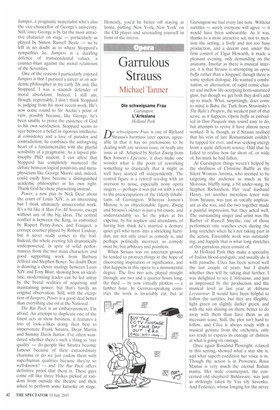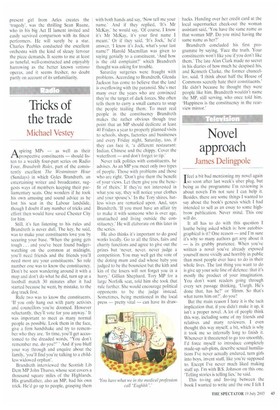Garrulous Strauss
Michael Tanner
Die schweigsame Frau Garsington L'Arlesiana Holland Park
Die schweigsame Frau is one of Richard Strauss's harmless later operas, agreeable in that it has no pretensions to be dealing with any serious issue, or really any issue at all. Adapted by Stefan Zweig from Ben Jonson's Epicoene, it does make one wonder what is the point of reworking something so drastically that it might as well have started off independently. The central figure is a retired sea-dog with an aversion to noise, especially noisy opera singers — perhaps it was put on with a nod to the preoccupations of the elderly inhabitants of Garsington. Whereas Jonson's Morose is an objectionable figure, Zweig and Strauss's oldster is just a bit crusty, and understandably so. So the jokes at his expense, by his nephew and attendants, of having him think he's married a demure quiet girl who turns into a shrieking harridan, are not only cruel as comedy is, and perhaps politically incorrect, as comedy must be, but arbitrary and pointless.
When Strauss was on uncertain ground he tended to protract things in the hope of discovering inspiration or significance, and that happens in this opera to a monumental degree. The first two acts, played straight through, are two and a quarter hours long, the third — by now virtually plotless — a further hour. In German-speaking countries the work is invariably cut, but at Garsington we had every last note. Without surtitles — surely everyone will agree — it would have been unbearable. As it was, thanks to a most attractive set, not to mention the setting, a lively and not too busy production, and a decent cast, under the firm control of Elgar Howarth, it made a pleasant evening, only demanding on the anatomy. Insofar as there is musical interest, it is that Strauss is attempting an opera buffa rather than a Singspiel, though there is some spoken dialogue. He wanted a combination, or alternation, of rapid comic chatter and mellow life-accepting horn-saturated glow, but though we get both they don't add up to much. What, surprisingly, does come to mind is Baba the Turk from Stravinsky's The Rake's Progress, the weakest part of that score, as it happens. Opera buffa as embodied in Don Pasquale may sound easy to do, but attempts to revive it have almost never worked. It is, though, as if Strauss realised that his vein of late Romanticism couldn't be tapped for ever, and was seeking energy from a quite different source. Odd that he failed to realise how far short of, or wide of, his mark he had fallen.
At Garsington things weren't helped by the shrillness of Christine Buffle as the Silent Woman Aminta, who seemed to be targeting the audience as much as Sir Morosus, bluffly sung, a bit under-sung, by Stephen Richardson. Her 'real' husband Henry, yet another merciless tenor role from Strauss, was just as vocally unpleasant as she was, and the two together made a painful impression, but they acted well. The outstanding singer and artist was the Barber of Russell Smythe, one of those performers one watches even during the long stretches when he's not taking part in the action. Ensemble work was outstanding, and happily that is what long stretches of this garrulous piece consist of.
At Holland Park they make a speciality of Italian blood-and-guts, and usually do it with panache. Cilea has been served well the last couple of years, but I doubt whether they will be taking that further. I was delighted to see L'Arlesiana, and just as impressed by the production and the musical level as last year at Adriana Lecouvreur. It would have been helpful to follow the surtitles, but they are illegible, light green on slightly darker green, and with the sun shining on them; better to do away with them than have them as an incessant tease. Still, the plot isn't hard to follow, and Cilea is always ready with a musical gesture from the orchestra, only too ready to express its outrage or distress at what is going on onstage.
Once again Rosalind Plowright, relaxed in this setting, showed what a star she is, and what superb condition her voice is in. Though the action is in Provence, Rosa Mamai is very much the eternal Italian mama. Her male counterpart, the concerned old shepherd Baldassare, was just as strikingly taken by Vas sily Savenko. And Federico, whose longing for the never present girl from Arles creates the 'tragedy', was the thrilling Sean Ruane, who in his big Act II lament invited and easily survived comparison with its finest performers. He will surely be a star. Charles Peebles conducted the excellent orchestra with the kind of sleazy fervour the piece demands. It seems to me at least as tuneful, well-constructed and enjoyably harrowing as the better known verismo operas, and it seems fresher, no doubt partly on account of its unfamiliarity.



























































 Previous page
Previous page